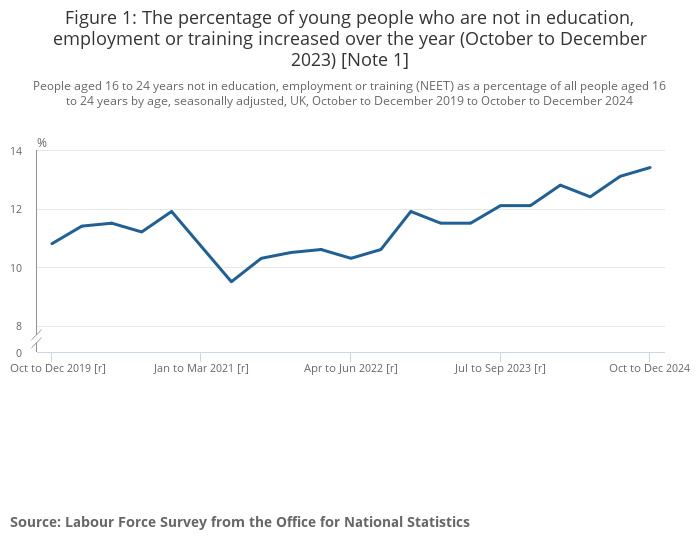Rising NEET Rates: 13.4% of 16-24 Year-Olds are NEETs | ONS February 2025

- Labour Force Survey (LFS) estimates have been affected by increased volatility, resulting from smaller achieved sample sizes, meaning that estimates of change should be treated with additional caution; we recommend using them as part of our suite of labour market indicators alongside workforce jobs (WFJ), Claimant Count data, and Pay As You Earn Real Time Information (PAYE RTI) estimates.
- The LFS continues to be the sole source of data for unemployment, economic inactivity, and self-employment, and provides a range of breakdowns that are only possible from LFS data.
- It is likely that some of the recent movements in LFS estimates are being affected by the increased sample size and change in data collection methods taken over the last year, in addition to any underlying changes in the labour market.
- LFS estimates are weighted to 2022 mid-year population estimates for periods from January to March 2019; headline UK seasonally adjusted series before this have been modelled, but other series have a discontinuity at this point.
- There was an increase in the number of young people aged 16 to 24 years not in education, employment or training (NEET) in October to December 2024; the total is currently estimated to be 987,000, up from 877,000 in October to December 2023.
Total young people who were not in education, employment or training (NEET)
An estimated 13.4% of all people aged 16 to 24 years in the UK were not in education, employment or training (NEET) in October to December 2024. This is up 1.3 percentage points, compared with October to December 2023, and up 0.3 percentage points on the previous quarter.
An estimated 14.4% of young men (up 1.2 percentage points on the year) and 12.3% of young women (up 1.3 percentage points on the year) were NEET. There were 987,000 young people who were NEET in total, an increase of 110,000 on the year. This increase was caused by both young men, with an increase of 56,000 on the year, and young women, with an increase of 53,000 on the year. Of the total number of young people who were NEET, 542,000 were young men and 445,000 were young women.
The total number of people aged 18 to 24 years who were NEET was 907,000, up 90,000 on the previous year.
The percentage of those aged 18 to 24 years who were NEET was 15.8%, which was up 1.3 percentage points on the year and up 0.3 percentage points on the quarter.
People aged 16 to 24 years not in education, employment or training (NEET) as a percentage of all people aged 16 to 24 years by age, seasonally adjusted, UK, October to December 2019 to October to December 2024

Unemployed young people who were not in education, employment or training
There were an estimated 392,000 young people NEET aged 16 to 24 years who were unemployed in October to December 2024. This was up 84,000 from October to December 2023, but down 14,000 from July to September 2024. An estimated 251,000 of these unemployed young people NEET were young men, and 141,000 were young women. The number of men NEET aged 16 to 24 years who were unemployed increased by 49,000 from October to December 2023. The number of women NEET aged 16 to 24 years who were unemployed increased by 35,000 on the year.
Economically inactive young people who were not in education, employment or training
There were an estimated 595,000 economically inactive young people aged 16 to 24 years who were NEET in October to December 2024. This was up 26,000 on the year from October to December 2023, and up 37,000 on the quarter from July to September 2024. The number of young men who were NEET and economically inactive was 291,000, and the corresponding number of young women was 304,000. The total increase of 26,000 on the year was led by young women, who saw an increase of 18,000 from October to December 2023. Young men aged 16 to 24 years who were NEET and economically inactive increased by 7,000 on the year.
Sector Reaction
Stephen Evans, chief executive at Learning and Work Institute (L&W), said:
“There are now almost one million young people estimated to not be in education, employment or training, risking long-term harm to their career prospects. Problems with the Labour Force Survey mean the data are uncertain, but there does seem to be an upward trend in recent years, particularly for young men. Today’s worrying rise may signal further trouble ahead in the absence of economic growth, and highlights the importance of implementing a Youth Guarantee so all young people are offered a job, training place or apprenticeship.”
Simon Ashworth, AELP Deputy CEO and Director of Policy:
“The number of young people not in education, employment or training goes from bad to worse. Without urgent action this is a crisis that will continue to grow. However, there is no silver bullet and will need a basket of measures. If the government is ambitious on its foundation apprenticeships offer, this could be part of the solution as could incentives for employers to take on younger apprentices.
“More pressing though is the current uncertainty on in-year growth funding for 16-19 which must be resolved. Given the demographic bulge of young people, we will need extra capacity in the system. ITPs are fleet of foot and stand ready to adapt but not if their hands are tied and their feet are in concrete!”
Ben Harrison, Director of the Work Foundation at Lancaster University, said:
“Today’s data shows that young people not in employment education or training is at the highest level for 10 years, which could be cause for concern for the Government’s plan to boost employment levels.
“With falling vacancies and a sluggish labour market, estimates appear to show that young people are being hit hardest as a further 110,000 young people are not in education, employment or training compared to a year ago.
“Contrary to recent commentary, the figures suggest large numbers of young people are actively looking for work but struggling to find it as 392,000 young people are unemployed – and 64% are young men. However, when they do enter employment, Work Foundation analysis shows that young people are twice as likely to end up in severely insecure jobs as older workers – with potential implications for their future earnings, health and wellbeing.
“This data underlines the urgency of the Government’s ambitions outlines in the Get Britain Working White Paper. Today’s figures appear to show that nearly half of NEETs are 22-24 years olds and risk missing out on initiatives such as the Youth Guarantee which as it stands will be available to 18-21 year olds. The Government should consider expanding these initiatives to allow the largest number of young people to benefit from help to get back into training or employment in the years ahead.”
Russell Hobby, CEO of Teach First, said:
“Almost one in seven young people are no longer in education, employment or training – a stark failure of our duty to the next generation. With young people from disadvantaged background hardest hit, today’s unjust figures should ring alarm bells across the country.
“A brilliant education is the foundation for future success for young people – empowering them to follow their dreams whilst growing our economy with a skilled workforce. The government must increase and prioritise funding to schools serving the most disadvantaged communities – to help rewrite this narrative and open the door to a brighter future for all.”
Barry Fletcher, CEO at Youth Futures Foundation, commented:
“The latest ONS data reveals the number of young people not earning or learning continues to rise in the UK, with almost a million young people not in education, employment or training. That is one in eight young people across the country.
“If we are to prevent long-term scarring effects for young people and achieve the economic growth needed in our country then we need sustained focus on the issue. We’d like to see the UK set a long-term goal to have the highest participation rate overall in the OECD for young people by 2050. If we could match the Netherlands who lead the way in this, we would get 500,000 more young people into work and boost our economy by £69bn.
“This ambition is the focus for a new cross-party inquiry we are pleased to be supporting, led by Policy Connect. Co-chaired by Lauren Edwards MP, Josh Babarinde OBE CF MP, and Lord Shinkwin, the inquiry will look to develop an ambitious policy agenda and plan to achieve this ‘north star’ goal.”
“At Youth Futures, we recognise the scale of the challenge, but also the enormous economic and social rewards of addressing it. If we were to match the 1 in 20 NEET rate of the Netherlands, we could contribute £69bn to the UK economy over the long term and ensure as many as 500,000 young people avoid the long-term scarring effects of being NEET.”
Dr Andrea Barry, Principal Economist at Youth Futures, added:
“This figure of 987,000 is a rise of over 100,000 in one year, and over 250,000 more young people than three years ago when we were emerging from the pandemic.
“Since 2021, NEET rates have risen consistently, with both unemployment and economic inactivity as the driving forces. This contrasts with the post-2008 trend in which unemployment increased dramatically while economic inactivity remained stable.
“The data also reveals half of the increase in economic inactivity over the past three years is due to ill health, with mental health being one of the most common health conditions driving this.
“As the youth employment challenge worsens, it’s imperative we continue to expand the evidence base to find out what works and ensure policymakers, employers and others put this evidence into action.”











Responses